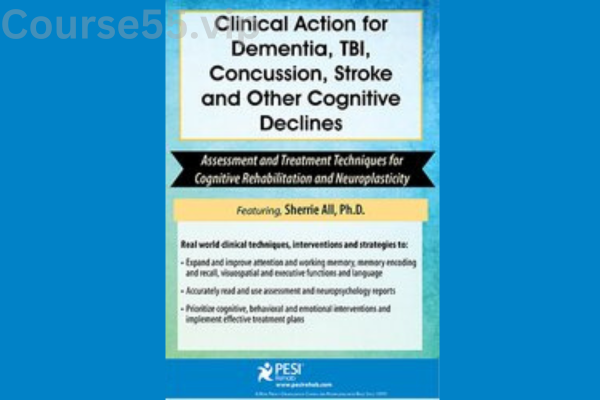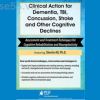Clinical Action for Dementia, TBI, Concussion, Stroke and Other Cognitive Declines: Assessment and Treatment Techniques for Cognitive Rehabilitation and Neuroplasticity By Sherrie All – PESI
$199.00 Original price was: $199.00.$23.10Current price is: $23.10.
Clinical Action for Dementia, TBI, Concussion, Stroke and Other Cognitive Declines: Assessment and Treatment Techniques for Cognitive Rehabilitation and Neuroplasticity by Sherrie All – Digital Download!

Clinical Action for Dementia, TBI, Concussion, Stroke and Other Cognitive Declines: Assessment and Treatment Techniques for Cognitive Rehabilitation and Neuroplasticity By Sherrie All – PESI
Overview

Enhancing Cognitive Rehabilitation: Insights from Clinical Action for Dementia, TBI, Concussion, Stroke, and Other Cognitive Declines
Understanding and effectively treating cognitive decline is a critical challenge in modern healthcare. Dr. Sherrie All’s Clinical Action for Dementia, TBI, Concussion, Stroke, and Other Cognitive Declines: Assessment and Treatment Techniques for Cognitive Rehabilitation and Neuroplasticity serves as a comprehensive guide for clinicians, detailing innovative strategies to improve cognitive function. This article explores the key takeaways from Dr. All’s review, focusing on assessment techniques, neuroplasticity, and evidence-based treatment approaches.
Understanding Cognitive Decline
Cognitive impairments can stem from a range of neurological conditions, including dementia, traumatic brain injury (TBI), and stroke. Each condition presents unique challenges:
• Dementia: Progressive memory loss and difficulty with reasoning.
• TBI: Sudden cognitive deficits due to head trauma.
• Stroke: Immediate impairments in cognitive and motor functions based on the affected brain region.
Dr. All emphasizes the need for precise assessments to identify specific cognitive deficits. These evaluations may include standardized cognitive tests, observational methods, and patient interviews to ensure a thorough understanding of memory, attention, and executive function challenges. By tailoring rehabilitation plans to each patient’s condition, clinicians can enhance recovery outcomes.
The Power of Neuroplasticity in Rehabilitation
A core concept in Dr. All’s review is neuroplasticity—the brain’s ability to reorganize itself by forming new neural connections. Leveraging neuroplasticity is crucial in cognitive rehabilitation, as it facilitates recovery even in severe cases.
Several factors influence neuroplasticity, including age, injury severity, and cognitive training. While younger patients may experience faster neural reorganization, research shows that with structured therapy, individuals of any age can improve cognitive function.
Key Strategies for Enhancing Neuroplasticity:
• Cognitive Training: Exercises that challenge memory, attention, and problem-solving abilities.
• Occupational Therapy: Incorporating real-world tasks into therapy sessions to encourage practical cognitive engagement.
• Physical Activity: Studies suggest a strong link between movement and cognitive improvement.
• Mindfulness Practices: Techniques like meditation can enhance focus and emotional resilience.
By integrating these strategies, clinicians can help patients harness the brain’s natural adaptability for meaningful recovery.
Evidence-Based Treatment Techniques
Dr. All highlights the importance of evidence-backed interventions in cognitive rehabilitation. The review outlines various modalities proven to enhance cognitive function:
• Cognitive Behavioral Therapy (CBT): Helps patients develop strategies to manage cognitive deficits and emotional challenges.
• Speech and Language Therapy: Assists individuals struggling with communication by improving language processing.
• Group Therapy: Encourages social support and provides an interactive setting for cognitive exercises.
A multidisciplinary approach—combining psychology, occupational therapy, and medical interventions—ensures that patients receive comprehensive treatment for their cognitive challenges.
Building Cognitive Reserve for Long-Term Resilience
Another critical concept in Dr. All’s review is cognitive reserve—the brain’s ability to withstand neurological damage. Research suggests that individuals with greater cognitive reserve exhibit better functional outcomes despite brain injuries.
Factors Contributing to Cognitive Reserve:
• Education Level: Higher education is linked to increased cognitive resilience.
• Complex Occupational Tasks: Jobs requiring problem-solving and analytical skills strengthen cognitive networks.
• Social Engagement: Strong interpersonal relationships promote brain health.
By encouraging lifelong learning and social participation, clinicians can help patients build cognitive reserves that serve as protective buffers against decline.
Applying These Principles in Clinical Practice
Dr. All provides actionable insights for integrating these techniques into real-world clinical settings.
Key Steps for Clinicians:
• Stay Updated: Continuously engage with emerging research in neuropsychology and rehabilitation.
• Adopt a Collaborative Approach: Work with professionals from different fields, including psychology, occupational therapy, and neurology.
• Monitor Patient Progress: Adjust treatment plans based on ongoing assessments to maximize recovery outcomes.
By implementing these strategies, healthcare providers can offer patients more effective, personalized treatment plans.
Conclusion
Dr. Sherrie All’s review, Clinical Action for Dementia, TBI, Concussion, Stroke, and Other Cognitive Declines, provides an essential resource for clinicians working in cognitive rehabilitation. Through a combination of precise assessments, neuroplasticity-driven strategies, and evidence-based treatments, this review equips professionals with the tools needed to enhance patient outcomes.
As cognitive health becomes an increasing priority, the principles outlined in this review highlight the importance of ongoing adaptation and innovation in rehabilitation techniques. By embracing these approaches, clinicians can help patients maximize their cognitive potential and improve their quality of life.
Frequently Asked Questions:
Business Model Innovation: We operate a group buying strategy, allowing participants to share costs and access popular courses at reduced prices. This model benefits individuals with limited financial resources, despite concerns from content creators about distribution methods.
Legal Considerations: The legality of our operations involves complex issues. Although we don’t have explicit permission from course creators to resell their content, there are no specific resale restrictions stated at the time of purchase. This ambiguity creates an opportunity for us to provide affordable educational resources.
Quality Control: We ensure that all course materials purchased are identical to those offered directly by the creators. However, it’s important to understand that we are not official providers. As such, our offerings do not include:
– Live coaching calls or sessions with the course author.
– Access to exclusive author-controlled groups or portals.
– Membership in private forums.
– Direct email support from the author or their team.
We aim to reduce the cost barrier in education by offering these courses independently, without the premium services available through official channels. We appreciate your understanding of our unique approach.
Be the first to review “Clinical Action for Dementia, TBI, Concussion, Stroke and Other Cognitive Declines: Assessment and Treatment Techniques for Cognitive Rehabilitation and Neuroplasticity By Sherrie All – PESI” Cancel reply
You must be logged in to post a review.

 Acceptance and Commitment Therapy (ACT) Made Easy: Innovative Techniques for Depression, Anxiety, Trauma & Personality Disorders By Douglas Fogel - PESI
Acceptance and Commitment Therapy (ACT) Made Easy: Innovative Techniques for Depression, Anxiety, Trauma & Personality Disorders By Douglas Fogel - PESI 















Reviews
There are no reviews yet.